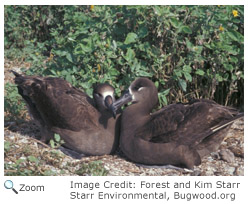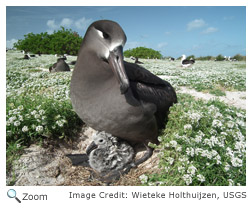Life Cycle
 Mating season runs from November through February. Females and males do a mating ritual that involves twining their necks together and flapping their wings.
Mating season runs from November through February. Females and males do a mating ritual that involves twining their necks together and flapping their wings.
 Females lay one egg in a shallow depression in the ground. The black-footed albatross nests on islands in colonies. Both the male and the female incubate the egg and feed the chick regurgitated food. Once a chick leaves the nest, it won't return to its breeding island for five or six years, when it is fully mature. The black-footed albatross mates for life.
Females lay one egg in a shallow depression in the ground. The black-footed albatross nests on islands in colonies. Both the male and the female incubate the egg and feed the chick regurgitated food. Once a chick leaves the nest, it won't return to its breeding island for five or six years, when it is fully mature. The black-footed albatross mates for life.
Behavior
The black-footed albatross will scare other predators away from its food by spreading its wings and screaming at it.
For more information about the albatross, visit the Albatross Project at Wake Forest University.